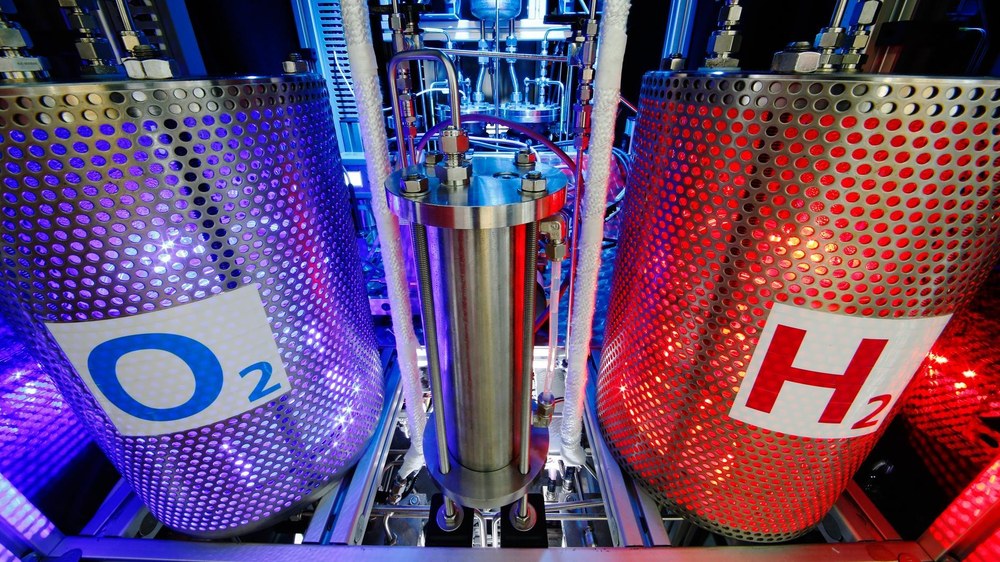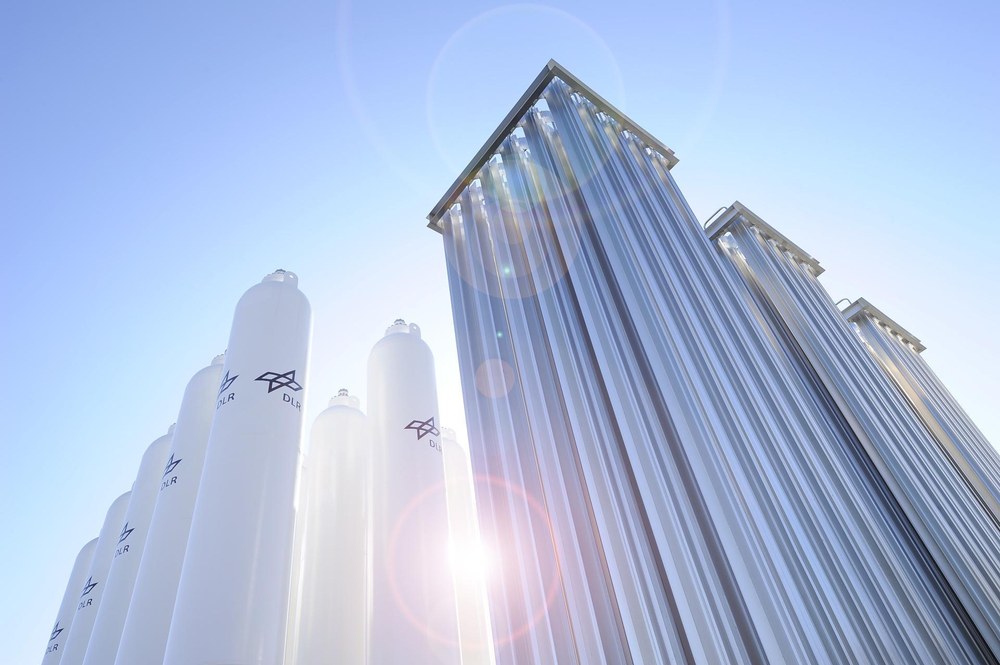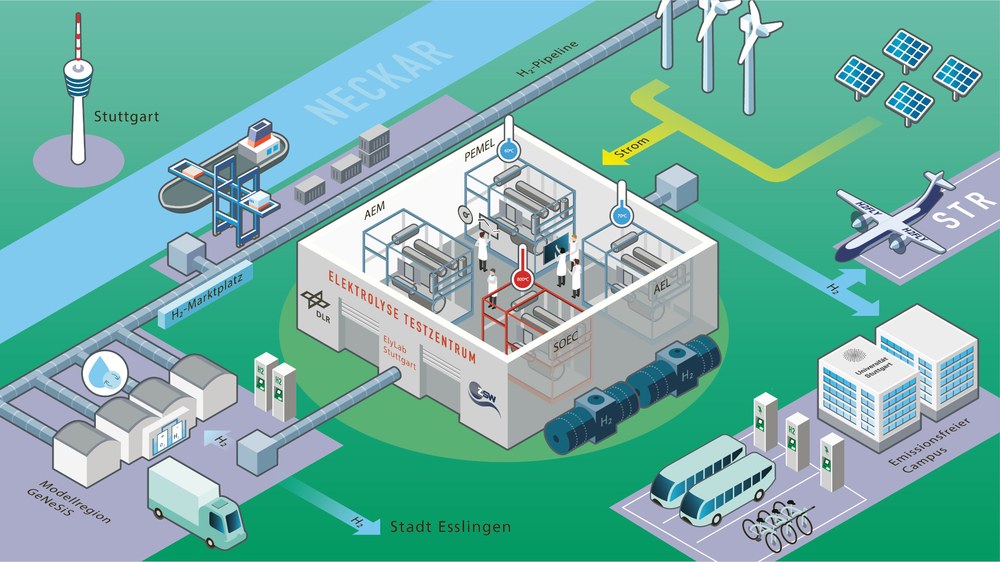DLR and ZSW plan new test and innovation centre for water electrolysis

DLR / Thomas Ernsting


- DLR and ZSW have signed memorandum for the establishment of a new joint electrolyser test and innovation centre for the production of hydrogen.
- The provision of standardised test procedures as a service will support the development and construction of electrolysis plants up to the megawatt scale.
- A feasibility study has clarified the necessary framework conditions and identified suitable locations for the centre in the greater Stuttgart area.
- Focus: Energy, energy storage, energy efficiency, hydrogen, climate change
The German Aerospace Center (Deutsches Zentrum für Luft- und Raumfahrt; DLR) and the Center for Solar Energy and Hydrogen Research Baden-Württemberg (ZSW) are planning to establish a test and innovation centre for water electrolysis. The two institutions recently signed a memorandum to this effect. The joint test centre, known as ElyLAB, will combine the organisations’ competencies related to current electrolysis technologies under one roof. DLR and ZSW are thus pooling their decades of experience in the production of hydrogen via electrolysis.
Test and innovation centre supports expansion of hydrogen economy
At the ElyLAB test and innovation centre, the DLR Institute of Engineering Thermodynamics and the ZSW will establish standardised test procedures for all current electrolysis technologies. The two institutions intend to begin offering these procedures as a service in 2023. The goal is to shorten development times and accelerate the transition to hydrogen as an energy carrier.
Das DLR-Institut für Technische Thermodynamik und das ZSW planen mit dem Test- und Innovationszentrum ElyLAB standardisierte Prüfverfahren für alle Elektrolysetechnologien zu etablieren. Ab 2023 wollen DLR und ZSW diese als Dienstleistung anbieten. Das Ziel ist, Entwicklungszeiten zu verkürzen, um den Umstieg auf Wasserstoff als Energieträger zu beschleunigen.
„Mit dem gemeinsamen Wissen und der Technologiebreite von DLR und ZSW wollen wir Industriepartner und Unternehmen unterstützen. Einheitliche Testprozeduren und Schnellalterungstests ermöglichen Bauteile und Systeme neutral zu bewerten und zu zertifizieren. Dies umfasst Materialanalysen, Komponententests bis zur praxisnahen Erprobung ganzer Systeme im Megawattbereich“, erklärt Prof. Andreas Friedrich vom DLR-Institut für Technische Thermodynamik.
Künftiger Bedarf an „grünem“ Wasserstoff erfordert industriefähige Elektrolyseanlagen
Die wirtschaftliche Herstellung von „grünem“ Wasserstoff aus erneuerbaren Energien im industriellen Maßstab ist ein zentraler Baustein der Energiewende. Um die Nationale Wasserstoffstrategie und den Green Deal der Europäischen Union umzusetzen, ist ein Ausbau der Elektrolysekapazitäten um rund einen Faktor 50 notwendig. Dies erfordert Elektrolyseanlagen mit Leistungen von mehreren Megawatt. Dafür werden industriefähige Materialien, Komponenten und Komplettsysteme benötigt. Herausfordernd sind dabei die Größe der Elektrolysemodule und deren industrielle Serienfertigung.
Standardised testing and cross-technology analysis capabilities are required for the industrial expansion of the hydrogen economy. "So far, there is little experience on how to evaluate electrolysers in an unbiased manner. For example, there is still a lack of generally accepted methods for examining how the components age," explains Friedrich.
The Baden-Württemberg Ministry of Economic Affairs, Labour and Tourism is supporting a feasibility study for the ElyLAB cooperation. The researchers are currently recording the necessary framework conditions for the test centre and identifying suitable locations in the greater Stuttgart area. Results are expected towards the middle of the year.
The Stuttgart Region is a 'Green Hydrogen Model Region'
The study also covers the integration of the test centre into hydrogen infrastructure in the Stuttgart metropolitan area from 2024. The Stuttgart region was selected for the ‘Green Hydrogen Model Region’ funding programme of the Baden-Württemberg Ministry for the Environment, Climate Protection and Energy and the European Union. This will allow existing local distribution networks to be used and regional customers to be supplied with generated hydrogen. This includes the automotive and component supplier industry as well as mobility and transport service providers.
Pooled competencies – extracting, storing and using hydrogen
The decades of experience of DLR and ZSW are flowing into the ElyLAB cooperation project. DLR is active in all areas of hydrogen research and along the entire process chain – from generation to storage and utilisation. To this end, the DLR Institute of Engineering Thermodynamics conducts research on highly efficient water electrolysers and fuel cells.
